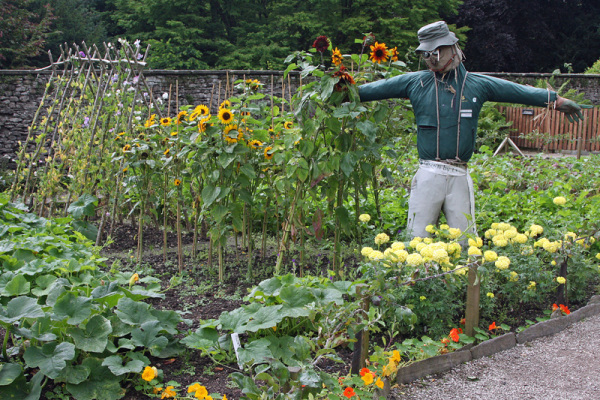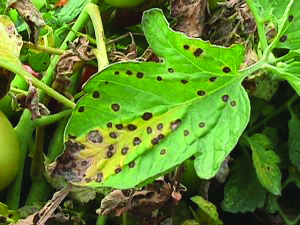
The heat and humidity of summer are here. The vegetables are growing. The cucumbers are trailing everywhere. The tomatoes are getting so tall that they are starting to tip. The pole beans are out of control. As wonderful as this is for food production, the conditions do create the perfect scenario for problems from insects and disease.
The first line of defense against disease development is to provide healthy, humus-laden soil. Clay soil is not the ideal soil in which to grow vegetables. Organic matter improves soil structure by improving soil drainage, soil aeration and water-holding capacity. Soil improvement is an ongoing activity as a gardener. Those gardeners who use raised beds will have an easier time improving the garden soil. as it is a determined, contained area. Compost, leaves and seed-free (preferably pesticide-free) grass clippings are easy-to-find materials that assist in improving soil. A healthy soil will be amenable to holding an adequate amount of nutrients for plant absorption. During the growing season, gardeners can side-dress their plants with compost and grass clippings. This side dressing will decompose throughout the season and become part of the soil.
The majority of the diseases on established plants are caused by fungi. Plants need space around them. Keep as much of the plant off the ground as possible. You want to stake or cage the tomatoes. Have the cucumbers and beans run up trellises or along fences. Next year, plant the beans near the corn and the cucumbers near the tomatoes so each can take advantage of their partners’ supports. Some gardeners have made mesh slings to get melons and cantaloupes off the ground.
There is a UT Extension brochure (#W316) titled Home Vegetable Disease Control. It is a great resource, as it covers multiple facets of disease prevention. Should one of your vegetables acquire a symptom of a disease, the material provides a chart in alphabetic order by vegetable of symptoms, controls and cultural practices of the most common vegetable diseases.
 Excessive water on plant foliage will promote disease. The ideal time to water is the morning: the earlier, the better. You do want the foliage to dry throughout the day. Watering in the middle of the day is not efficient and evening watering can easily promote problems, as the foliage is wet during the night. The least efficient and greatest contributor to unnecessary water on foliage is the sprinkler. If at all possible, use a drip irrigation system. This will provide water to the roots where it is needed while keeping it off the foliage, minimizing the potential for fungal conditions to develop. Organic fungicides include sulphur, copper, Bordeaux mixture and Neem oil.
Excessive water on plant foliage will promote disease. The ideal time to water is the morning: the earlier, the better. You do want the foliage to dry throughout the day. Watering in the middle of the day is not efficient and evening watering can easily promote problems, as the foliage is wet during the night. The least efficient and greatest contributor to unnecessary water on foliage is the sprinkler. If at all possible, use a drip irrigation system. This will provide water to the roots where it is needed while keeping it off the foliage, minimizing the potential for fungal conditions to develop. Organic fungicides include sulphur, copper, Bordeaux mixture and Neem oil.
Insects can also damage your crops. If you decide to use either organic or synthetic pesticides to control insects, it is very important to read the directions on the label. They are poisonous, and you will want to avoid damaging yourself in the application. Do not assume that doubling the pesticide will be twice as effective. Instead, it will create problems. Please follow the directions for best results and for safety. If you choose the organic option, expect to apply the pesticide more often.
Along with the organic, natural approach to controlling destructive insects is the promotion of beneficial insects in the garden. These insects are ladybugs, lacewings, hover flies, tachinid flies and parasitic wasps. To encourage these insects in your garden, provide plants that help them to thrive. Plants from the aster, carrot and buckwheat families are useful as well as sweet alyssum, bachelor buttons, cosmos, coreopsis, catmint (Nepeta) and sunflowers.
Diligence and a perceptive eye are two qualities that will help your garden thrive. If something is amiss in the garden, do not hesitate to correct the problem as quickly as possible. The longer it exists, the bigger the problem becomes. Even with the potential for problems and disappointments in the garden, it is still a very satisfying activity.
Farmers’ Market Education classes continue to be held in the Community Center at the Agricultural Park on John R. Rice Blvd. They are free and start at 9 a.m. on Tuesdays and Fridays.
 Upcoming Farmers’ Market Classes:
Upcoming Farmers’ Market Classes:
July 3 – Reggie Reeves, CMG: Organic Gardening Part I
Safe, effective options and methods for your home use.
July 7 – Edwina Shannon, CMG: Garden Signs
How to create your own humorous or practical signs to decorate your garden.
July 10 – Mark Murphy, CMG: Compost and Soil Health
What is composting? How do I start? What is it good for? Find out today!
July 14 – Marilyn Rogan, CMG: Saving and Organizing Seeds
Getting your seeds organized will save you money.
July 17 – Jane McNulty: Music for Everyone
Learn how to use music to feel better, exercise your brain and decrease stress.
July 21 – Richard Lee, CMG: Fall Garden Planning
Gardening can be done almost year-round! Learn what to plant for the fall to extend the season.
July 24 – Carla Bush, Ext. Agent: Putting up Tomatoes
Have a plan for preserving those gorgeous, fresh tomatoes so that you capture them at their peak. Can, freeze or dry home garden jewels so that you may enjoy them throughout the year.
July 28 – Carla Bush, Ext. Agent: Seasonal Eating
Taste new dishes made with the season’s freshest, locally grown produce.
July 31 – Michael Shirley, Riverdale High School: Backyard Chickens 101
Raising chickens in your backyard for egg production.
Aug. 4 – Tiffany Schmidt, Ext. Program Assistant: Cooking with Kids
Introduce young ones to the joys of cooking and fun, healthy snacks.
Aug. 7 – Mitchell Murphree, Chef at Five Senses Restaurant: Five Senses Cooking Demo
Sample “Southern gourmet” dishes and pick up tips from one of our local professional chefs.














thx
Comment July 24, 2015 @ 7:59 pm